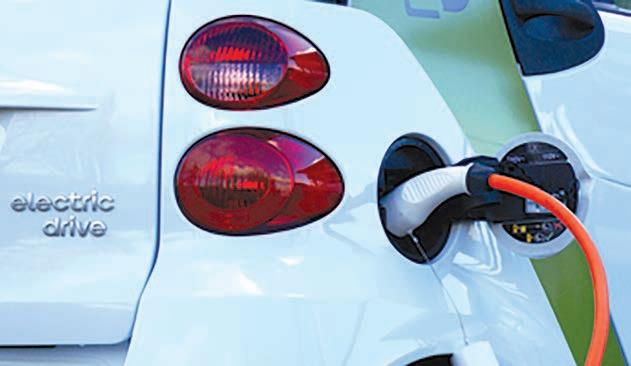
4 minute read
finance
Drive off with tax benefits for ultra low emission vehicles
The convenience of driving your own vehicle typically offsets the costs of owning a vehicle. With the recent announcement from the Office of Low Emission Vehicles that drivers of ultra-low emission vehicles (ULEVs) stand to receive tax benefits, now could be the time for private and business car drivers to consider switching to a ULEV to lower the costs of driving and help to reduce greenhouse gas emissions and air pollution on UK roads.
FUEL DUTY:
ULEVs, like plug-in electrical cars, will be exempt from the fuel duty applied to each litre of fuel used by vehicles with combustible engines, including hydrogen used in an internal combustion engine.
VEHICLE EXCISE DUTY (VED):
Vehicles emitting less than 100g CO2/km are considered zero emission cars.
Zero emission cars, valued at less than £40,000, are exempt from vehicle excise duty. All other vehicles registered on or after 1 April 2017 are subject to new rates of this tax, including an initial flat rate followed by an annual standard rate, which are determined by the vehicle’s level of CO2 emissions.
Diesel cars and cars emitting more than 75g CO2/km, will see a higher rate of VED.
VALUE ADDED TAX (VAT):
VAT is a consumption tax that applies to the price of vehicles, their fuels and electricity. Plug-in vehicles recharged with electricity at home pay only a 5% level of VAT for domestic, nonbusiness and charity use, compared to road fuels, including hydrogen, or electricity used for business, at 20%, regardless of their CO2 emissions.
TAXATION OF COMPANY CARS (CCT):
From 2020-21, company car tax bands will accommodate more ULEVs. Businesses using ULEVs as company cars use two bands of company car tax at 0-50g/km and 51-75g/km, which are charged at a lower rate, based on their list price, than vehicles in higher bands.
SALARY SACRIFICE FOR THE PROVISION OF BENEFIT IN KIND (BIK):
Employees who accept a ULEV as a benefit in kind from their employer, stand to gain from lower Income Tax and National Insurance (NI) if they agree to reduce their salary through a salary sacrifice scheme. ULEVs remain exempt from salary sacrifice reforms due to their environmental benefits.
VAN AND CAR FUEL BENEFIT CHARGE:
Electricity isn’t a fuel, so there is currently no fuel benefit charge for battery electric cars or vans. However, it can apply to plug-in hybrid cars or vans. Employees receiving free fuel from their employer pay a car fuel benefit charge as a benefit in kind, so the employee pays Income Tax and the employer pays National Insurance Contributions on the cash equivalent amount.
VAN BENEFIT CHARGE:
The 2018-19 van benefit charge is set at a flat rate of £3,350 and is levied when an employer provides an employee with a van for private use (not for incidental travel or daily commuting). The employee pays Income Tax on the amount and the employer pays National Insurance contributions. Zero emission vans are only liable for a proportion of 20% of the van benefit charge.
ADVISORY FUEL RATES (AFR):
AFRs offer a pence-per-mile rate based on the engine size and fuel type of the car. Employees can reimburse employers for the cost of private mileage where an employer provides free fuel for a company car, or employers can reimburse employees when they buy the fuel for their company car (this is not considered to be a taxable benefit). There is no AFR equivalent for battery electric vehicles.
ENHANCED CAPITAL ALLOWANCES (ECAs):
Businesses that purchase cars which emit less than 75g CO2 /km, zero emission goods vehicles, or ULEV recharging or refuelling infrastructure, are eligible for 100% first year allowance.
APPROVED MILEAGE ALLOWANCE PAYMENT (AMAPs):
Electric and hybrid cars are treated in the same way as petrol and diesel cars when it comes to AMAPs. Employers can reimburse their employees who use their own vehicles for business mileage, using HMRC rates without liability to Income Tax or National Insurance Contributions.
Excess reimbursements are reportable to HMRC. Self-employed taxpayers cannot claim capital allowances or running costs and mileage rates simultaneously.
MILEAGE ALLOWANCE RELIEF (MAR):
For the purposes of MAR, electric and hybrid cars are treated in the same way as petrol and diesel. If an employer does not fully reimburse an employee for the cost of business mileage in the employee’s own car in accordance with the AMAP rules, that employee is entitled to apply to receive MAR on the remainder of this amount.
If you’re a business owner or an individual tempted by tax breaks, or simply fancy a fuel change, speak to the Tax team at LWA on 0161 905 1801.
We’ll help ensure you’re accessing the full range of tax benefits available for drivers of low emission vehicles and let you know how you could save money, and the environment, in the long run.
Les Leavitt
Leavitt Walmsley Associates Chartered Certified Accountants www.lwaltd.com




